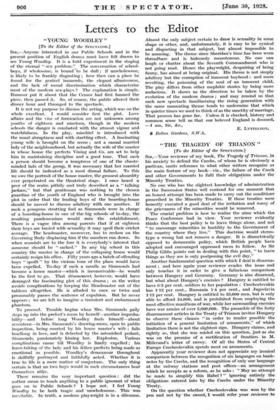Letters to the Editor
"YOUNG WOODLEY "
[To the Editor of the SPECTATOR.] SIR,—Anyone interested in our Public Schools and in the present position of English drama must have felt drawn to see Young Woodley. It is a bold experiment in the staging of the eternal " sex problem." The conversation of school- boys, if wholesome, is bound to be dull ; if unwholesome, is hicely to be frankly disgusting ; how then can a place be found for the genteel innuendo, the elegant allusiveness, and the lack of moral discrimination which characterize most of the modern sex-plays ? The explanation is simple. Rumour put it about that the Censor had first banned the piece, then passed it. So, of course, the public altered their dinner hour and thronged to the spectacle.
It is not my purpose to discuss the acting, which was on the whole excellent. I would consider first the plot. Love affairs and the vice of fornication are not unknown among youths of eighteen and nineteen, though in the modern schools the danger is combated with the utmost vigour and watchfulness. In the play, mischief is introduced with the usual abruptness and with startling effect. A fascinating young wife is brought on the scene ; not a casual married lady of the neighbourhood, but actually the wife of the master in whose house the prefects Vining and Co. are set to help him in maintaining discipline and a good tone. That such a person should become a temptress of one of the chaste- minded lads of the group, it was necessary that her married life should be indicated as a most dismal failure. To this we owe the portrait of the house master, the grossest absurdity ever perpetrated on the theatrical stage. I once heard a peer of the realm pithily and truly described as' a " talking jackass," but that gentleman was nothing to the chosen guardian of the youth of England who is brought into the plot in order that the leading boys of the boarding-house should be moved to discuss adultery with one another. If such a pompous strutting fool as Simmonds were in charge of a boarding-house in one of the.big schools of to-day, the' resulting pandemonium would Tido. 'the establishment. There is a vague idea among parents that if at eighteen their boys are busied with sexuality it may spoil their cricket average. The headmaster, moreover, has to reckon on the Governing Body displacing him if the numbers run down. So when scandals are to the fore it is everybody's interest that someone should be " sacked." In any big school in this country the master in charge of the collapsing house would certainly resign his office. Fifty years ago a batch of offending boys " spoilt " by the vicious tone of the place would have been expelled. To-day if such a noodle as Simmonds had become a house master—which is inconceivable—he would be the first to go. That denouement, however, would have deranged the fascinating plot of this drama ; so the writer avoids complications by keeping the Headmaster out of the tableau altogether. He is alluded to once or twice and presumably passes the sentence of expulsion. But he never appears ; we are left to imagine a transient and embarrassed phantom.
To proceed. Trouble begins when Mrs. Simmonds gaily steps up into the prefect's room by herself—another improba- bility—and before long Wooclley finds himself—about seventeen—in Mrs. Simmonds's drawing-robm, open to public inspection, being courted by his house master's wife ; falls headlong in love, and is detected by the astonished pedant, Simmonds, passionately using her. Explosion. Various complications ensue till Woodley is finally expelled ; his leave-taking of the lady and his fellow prefects being made as emotional as possible. Woodley's demeanour throughout is skilfully portrayed and faithfully acted. Whether it is true to 'life is a mere matter of conjecture. The only thing certain is that no two boys would in such circumstances bear themselves alike.
There remains the very important question : did the author mean to teach anything to a public ignorant of what goes on in Public Schools ? I hope trot. I feel Young Woodley to be both tragic and --unwholesome. This ' was inevitable. In truth; a modern playwright is 'in a dilemma. Almost the only subject certain to draw is sexuality in some shape or other, and, unfortunately, it is easy to be cynical and disgusting in that subject, but almost impossible to be amusing. The theme since Sheridan's time has been worn threadbare and is hideously monotonous. No one can laugh or chatter about the Seventh Commandment who is not going mad. Hence the playwright, despairing of being funny, has aimed at being original. His theme is not simply adultery but the corruption of innocent boyhood : and more revolting, the poisoning of the soul of an innocent child. The play differs froth other mephitic stories by being more audacious: It shows us the direction to be taken by the evolution of the modern drama ; and may remind us that each new spectacle familiarizing the rising generation with the same nauseating theme tends to undermine that which in quieter times we used to think of as the sanctity of marriage. That process has gone far. Unless it is checked, history and common sense tell us that our beloved England is doomed. —I am, Sir, &c., 8 Bolton Gardens, S.W.5. E. LYTTELTON.








































 Previous page
Previous page